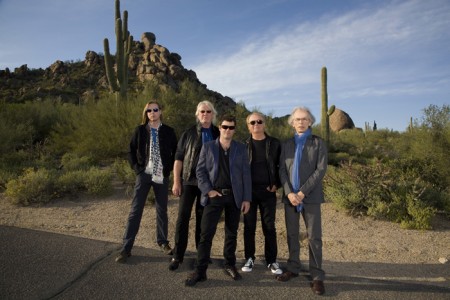
Since Yes got their start with their eponymous 1969 album, they’ve released 18 studio albums and nine live albums, securing their place as one of the immortal acts of progressive rock. With a new album due in July, Broadside sat down with bass player Chris Squire to talk about the band and the new album.
Seeing as this is the longest gap to date between Yes albums, how long did it take to create the album, from start to finish?
CS: We started working on ideas for the album around May. We did some rehearsals in Phoenix where I live then we started to record the album in October in Los Angeles and worked through until the middle of November. [Then we] went off and did a few more shows and got Christmas done with and in the middle of January we picked it up again and we just finished at the end of February. We’re pretty much 85 percent of the way through doing it now. We have to do a little bit of harmony/vocals and the mixing.
What can fans expect from the new album? There’s a 20-minute track in the vein of traditional Yes, right?
CS: The idea for the 20-minute track came from the end of working on the “Drama” album in 1980. It was a song we didn’t use at that time. It’s been dramatically changed of course and rewritten and put into a different setting from the idea we had then. It’s developed into this long-form piece of music. It’s the title track of the album. There are four other songs on the album that are individual, not linked together. They’ve all turned out well, too.
Are you excited for this to hit the streets?
CS: We’re going to definitely look for it to be out in July. It will be great because it’s our first studio recording in 10 years.
What’s been going on the past 10 years?
CS: We had a lot of live material released during that time. We’ve had various touring schedules that have gone on and then we did take a bit of a break from 2004 until 2007. We gave it a break at that time. We came back in 2008 and started working again, building up to the studio recording.
How did you go about getting Benoît David to join the band? It must be great for him, as a vocalist of a Yes tribute band, to get to join the real thing.
CS: I asked him if he’d like the job. He was surprised at first, no doubt about it, and he thought I was a friend of his punking him when I first called him. The good side to all that is that he’s been growing into the job. He’s been singing a couple years now. This will be the first studio album of new material that he’s ever done for us.
Have you seen Roger Dean’s artwork for the new album?
CS: I haven’t seen anything yet. He is working away at it as we speak. I’m going to be going to London in a week and a half or something. I’ll be looking at that then.
Even though of course in this modern day and age he could send it to me, but I’m sure it’s not done yet.
What does the future have in store for Yes?
CS: I mean, it’s fun to do live shows. Conversely, it’s good for the soul to go and challenge yourself to do new music in the studio.
I guess we’ll just carry on, see where we get to, see if we make an impression with this new album and take it from there. We can always go play worldwide, but I’m hoping the new album will be well received.
Do you feel that Yes has successfully connected with a younger generation of fans?
CS: Here’s quite an amazing thing — more and more, especially on this small tour we’re doing at the moment, I see a lot of young people in the audience. I’m assuming some of them must be the children of the original fans who got somewhat brainwashed when they were young.
They all seem to know the lyrics to the songs, they sing along. It’s very pleasing to see a change in the look of the audience. It’s definitely getting younger.
Could you name a recent artist or band you enjoy?
CS: Some of the people I’ve enjoyed seeing over the last 10 or 15 years are the Red Hot Chili Peppers who I think are an amazing band live.
I’m friends with the guys from the Foo Fighters, I think they’re a great live band. I’ve always been a big No Doubt fan, as well. I’ve seen all three of those guys live, and they’re very impressive.
How do you feel about the state of progressive rock?
CS: A lot of people tell me that there’s a new genre of younger bands doing progressive rock, but it seems to be a different style in which elements are being used from the progressive style.
I don’t know if it’s the same in every case. Anything that employs strange time signatures and music that has more than three chords could be said to be borrowing from that style.






Comments